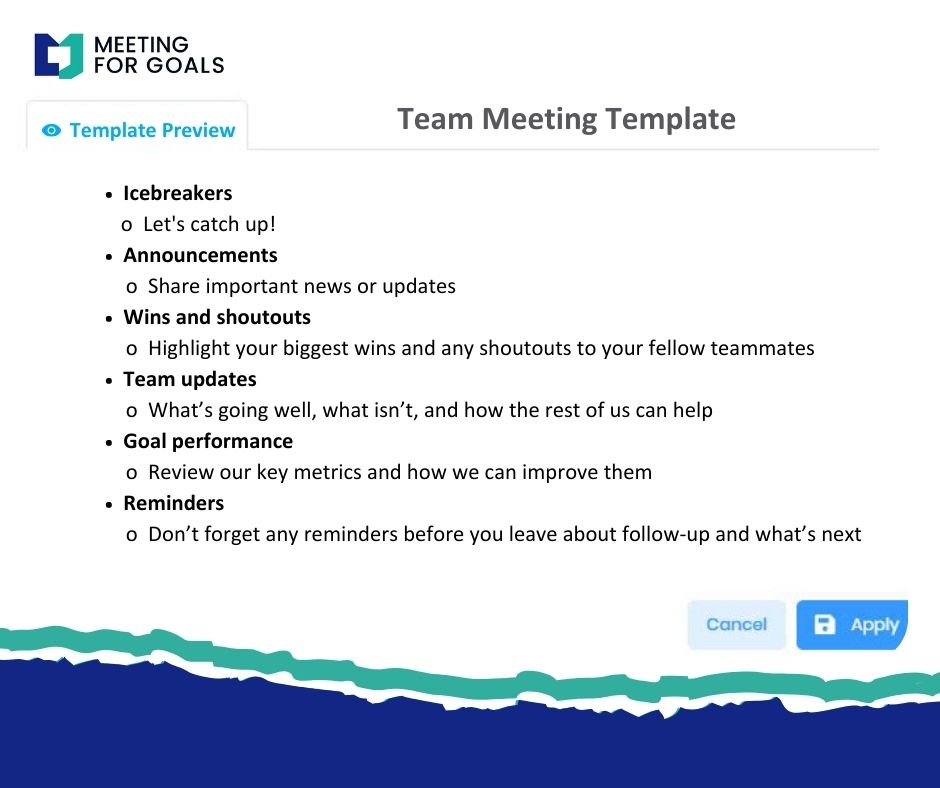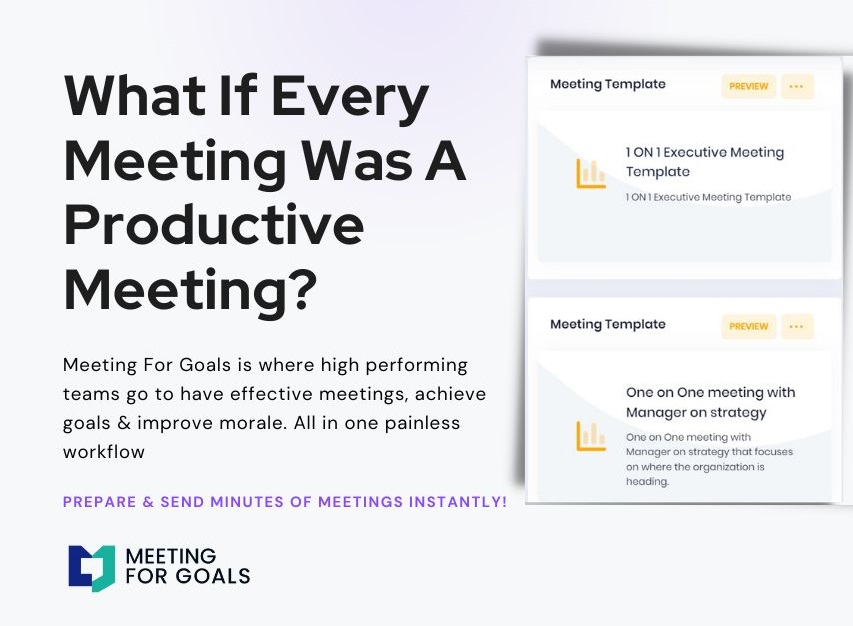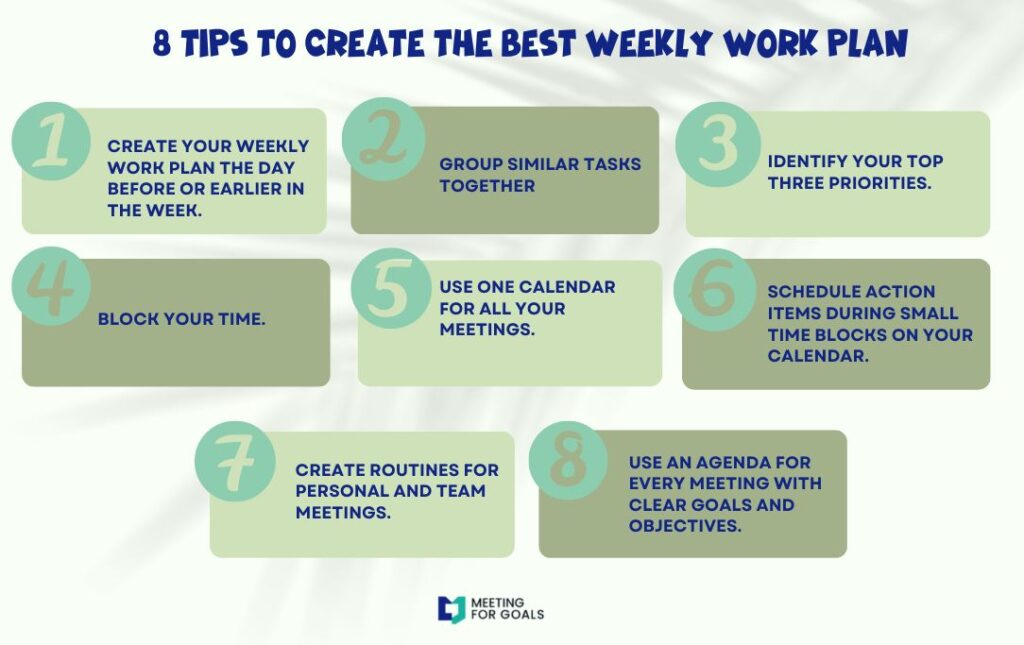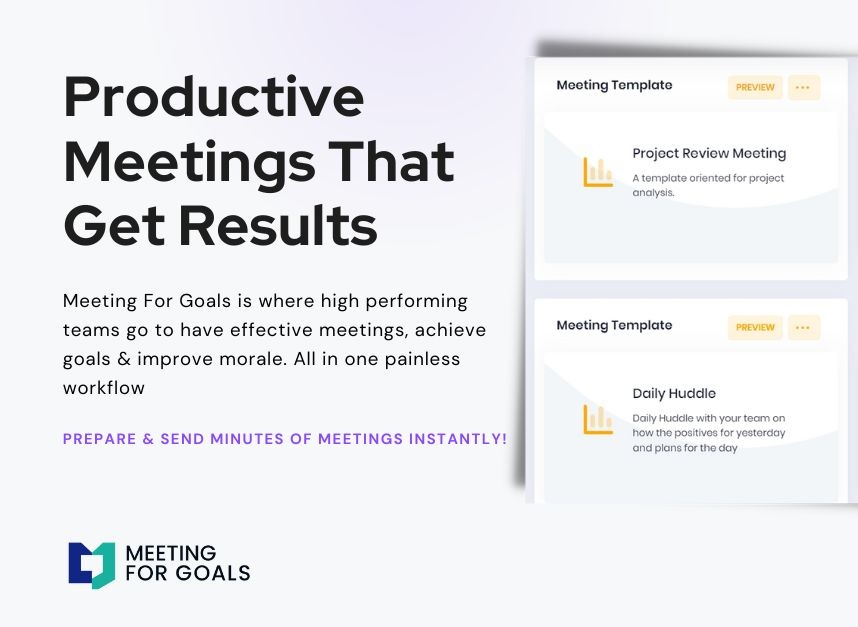Keyword Management Meeting Topics: A Strategic Guide for High-Performing Marketing Teams
I. Introduction
In today’s fast-paced digital landscape, your marketing team’s success depends on how well you manage keywords. Having a great keyword strategy isn’t enough if your team isn’t aligned and focused. That’s where structured, goal-driven meetings come in.
For mid-sized companies (typically 40 to 70 employees), every meeting matters. Time is limited, and inefficiency can cost you leads, rankings, and revenue. That’s why using a meeting management tool like Meeting For Goals can be a game-changer. It transforms scattered discussions into focused, results-oriented sessions.
Meeting For Goals helps teams:
- Stay aligned with company goals
- Assign responsibilities clearly
- Track progress effectively
It’s not just about better meetings—it’s about driving real business outcomes. If you haven’t already, check out our free meeting templates to get started on the right foot: https://meetingforgoals.com/meeting_templates.
This guide will walk you through how to run efficient, high-impact keyword management meetings. Whether you’re a Director of SEO, a VP of Marketing, or a CMO, you’ll learn how to turn your keyword discussions into a strategic advantage.
Keyword management is more than SEO—it’s about connecting your brand with the right audience. And like any mission-critical function, it deserves structured, goal-oriented attention.
Ready to elevate your meetings? Let’s dive in.
2 Minute Video
Watch a 2 minute demo of our meeting management software in action
II. Understanding Keyword Management
Before you can run effective keyword meetings, you need to understand what keyword management really means.
Keyword management is the ongoing process of finding, optimizing, and tracking the keywords that help people discover your content online. It’s a core part of SEO, PPC campaigns, and your overall content strategy.
But it’s not just about picking high-volume keywords. You need to understand what your audience is actually searching for—and why. This means digging into:
- User intent
- Search trends
- Competitive landscape
For example, someone searching “best CRM for small business” is likely ready to evaluate tools. That’s a high-intent keyword. On the other hand, “what is a CRM” might be better suited for top-of-funnel content.
Keyword management also ties directly to business outcomes. If you’re targeting the wrong keywords, your content won’t attract the right traffic. That means:
- Fewer leads
- Lower conversions
- Missed revenue opportunities
That’s why keyword management needs to be integrated into your larger marketing and business goals. If you’re launching a new product, your keyword strategy should align with that launch. If your sales team is targeting a new industry, your content should reflect that shift.
Keyword meetings are where these alignments happen. They bring together SEO experts, content creators, product managers, and even sales reps to share insights and make decisions.
Meeting For Goals makes this collaboration easier. It gives your team a central place to track keyword strategies, set goals, assign tasks, and monitor progress. This helps create a culture of continuous improvement and alignment.
Want to see how it works? Sign up here: https://app.meetingforgoals.com/TenantRegistration/Register
For a deeper dive into keyword research fundamentals, check out this beginner’s guide by Moz: https://moz.com/beginners-guide-to-seo/keyword-research
Adding an Agenda
How to add an agenda instantly on Meeting For Goals
III. Setting Clear Objectives for Keyword Management Meetings
One of the biggest reasons keyword meetings fall flat? No clear goals.
Without specific objectives, meetings can become long, unfocused, and frustrating. That’s why it’s important to set SMART goals—Specific, Measurable, Achievable, Relevant, and Time-bound.
Instead of saying, “Let’s improve our SEO,” a SMART goal would be: “Increase organic traffic to our blog by 20% in the next three months by targeting five new long-tail keywords.”
Here are a few examples of effective keyword meeting objectives:
- Identify 5-10 new keyword opportunities for next month’s content calendar
- Review rankings for underperforming keywords and create a plan to improve them
- Align keyword targets with an upcoming product launch or seasonal campaign
- Evaluate current keyword clusters and decide on updates or expansions
When you use Meeting For Goals, you can tie these objectives directly to your meeting agendas. That means everyone shows up knowing what needs to be accomplished—and who’s responsible for what.
You can assign tasks during the meeting, track deadlines, and follow up in future sessions. This keeps the momentum going and ensures that your keyword strategy isn’t just talked about—it’s executed.
Aligning meeting goals with company-wide objectives also boosts morale. When team members see how their keyword work supports larger business goals, they’re more motivated and engaged.
For example, if your company’s goal is to increase inbound leads by 25% this quarter, your keyword strategy should focus on high-converting, bottom-of-funnel terms.
This kind of alignment turns keyword meetings into strategic sessions, not just status updates.
Want to make your meetings more action-oriented? Use our meeting templates to get started: https://meetingforgoals.com/meeting_templates
IV. Analyzing Current Keyword Performance
Once your meeting goals are set, it’s time to look at how your keywords are currently performing.
This is where data takes center stage. Without real-time performance insights, you’re guessing—not strategizing.
Start by reviewing key metrics like:
- SERP rankings for target keywords
- Organic traffic per keyword
- Click-through rates (CTR)
- Bounce rate and time on page
- Conversion rates from organic traffic
- Keyword performance vs. competitors
Use tools like Google Search Console, SEMrush, or Ahrefs to gather this data. These platforms help you understand which keywords are delivering results—and which ones need a rethink.
For example, if a keyword is getting traffic but not converting, your content might not match user intent. Or if a keyword has high impressions but low CTR, your title tag or meta description might need updating.
Also, analyze keyword clusters and topic hubs. Are your pillar pages ranking well? Are your supporting blog posts linking back effectively?
These insights help you prioritize what to optimize next.
Meeting For Goals makes it easy to track this data over time. You can create recurring agenda items to review keyword performance, assign follow-up actions, and ensure accountability.
Visual dashboards are also a great addition to your meetings. They help stakeholders quickly grasp trends and make decisions faster.
If you’re looking for a deeper understanding of how to interpret keyword metrics, this guide from Search Engine Journal is a great resource: https://www.searchenginejournal.com/seo-guide/seo-keyword-research/
V. Brainstorming and Collaborating on Keyword Strategies
After analyzing performance, shift the meeting’s focus to future strategy.
Keyword strategy isn’t something one person should do in isolation. It works best when it’s a team effort.
Bring in voices from across your organization—content writers, SEO experts, product managers, and even sales reps. Everyone has insights that can shape your strategy.
For example, your sales team might hear recurring questions from prospects. Those questions can become blog topics or FAQ pages optimized for specific keywords.
To keep brainstorming sessions productive, use structured techniques like:
- Round-robin ideation (each person shares one idea)
- Mind mapping (visualizing keyword themes)
- SWOT analysis (Strengths, Weaknesses, Opportunities, Threats)
Encourage everyone to think about:
- New trends in your industry
- Gaps in your current content
- Questions your customers are asking
- Upcoming product or feature launches
Meeting For Goals supports this collaborative process with shared agendas, real-time note-taking, and task assignments. You can capture ideas, prioritize them, and assign follow-ups—all in one place.
The platform also helps keep brainstorming sessions aligned with your business goals. Every idea can be evaluated based on its potential impact, search volume, and relevance.
This ensures your keyword strategy stays focused—and doesn’t veer off into “nice-to-have” ideas that don’t drive results.
Want to try a structured brainstorming session? Check out our templates: https://meetingforgoals.com/meeting_templates
VI. Keeping Meetings Efficient and Engaging
Let’s face it—no one wants to sit through a long, boring meeting.
The key to productive keyword management meetings is structure and engagement. Start with a clear agenda. Stick to time limits. And make sure everyone knows their role.
Here’s a simple structure you can follow:
- Quick review of last meeting’s action items
- Update on keyword performance metrics
- Discussion of new keyword opportunities
- Brainstorming session
- Assignments and next steps
Keep meetings short—ideally 30 to 45 minutes. Use visual aids like dashboards or keyword maps to keep things engaging.
Encourage participation by rotating roles. One week, your SEO lead might run the meeting. Next week, it could be someone from content or product.
Also, celebrate wins. If a blog post you optimized last month is now ranking #1, give your team a shout-out. Recognition keeps morale high.
Meeting For Goals helps maintain this structure. You can create recurring agendas, track action items, and monitor task completion—all from one dashboard.
Want to keep your meetings on track and your team engaged? Sign up here: https://app.meetingforgoals.com/TenantRegistration/Register
VII. Conclusion
Keyword management is a critical part of your digital marketing strategy. It affects everything from visibility and traffic to lead generation and revenue.
But to truly unlock its potential, you need structured, collaborative, and goal-oriented meetings.
Here’s what we’ve covered:
- Why keyword management matters for your business
- How to set clear, measurable meeting objectives
- How to analyze keyword performance with data
- How to brainstorm and collaborate on new strategies
- How to run efficient, engaging meetings that drive action
Meeting For Goals is built for high-performing teams like yours. It helps you align your meetings with business goals, improve accountability, and save time.
If you’re ready to turn your keyword meetings into a strategic advantage, don’t wait. Sign up now and start transforming your team’s performance: https://app.meetingforgoals.com/TenantRegistration/Register
And if you’re looking for a head start, check out our free meeting templates: https://meetingforgoals.com/meeting_templates
Your keywords are the bridge between your brand and your audience. Make sure your meetings are building that bridge the right way.
To explore more ways to optimize your team’s productivity, visit our website: https://meetingforgoals.com
Take the first step toward smarter, faster, and more effective meetings—one keyword at a time.




